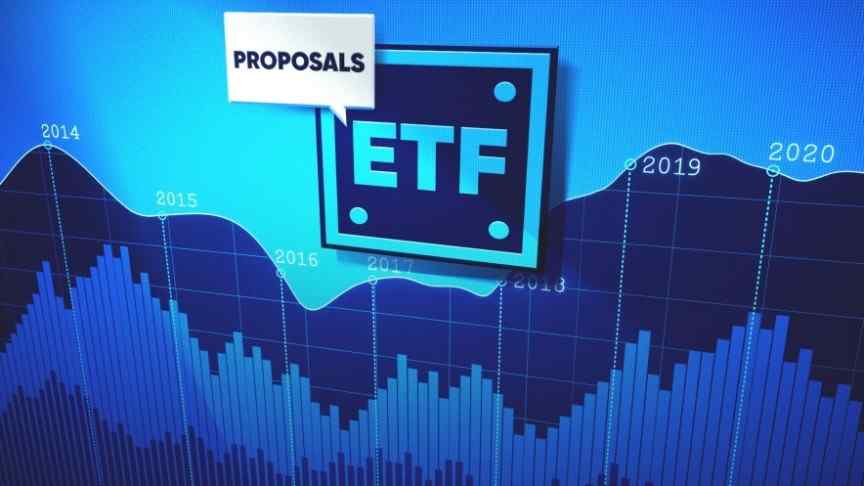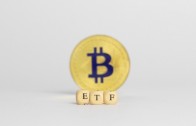
Bitcoin ETFs Part 2 of 3: A Not-So-Brief History of Important ETF Proposals
Sep 15, 2018, 4:16PMSeveral important financial institutions are seeking approval for a Bitcoin ETF. Who are they and why haven't they gotten approved yet?
In this article, the second of a series of three, we will explore who is behind the most important past, present, and future ETF proposals, and why most of them have been denied by the SEC.
In the first article, we looked at what ETFs are and how they could affect crypto prices. In the third we'll look at what the experts think the effect of Bitcoin ETFs will be on the market.
The possible approval of a Bitcoin exchange-traded fund by the United States SEC has been one of the most controversial topics of the cryptosphere this year, to the point of heavily impacting cryptocurrency prices. Last month, the SEC’s decision to postpone its ruling on VanEck’s third attempt at getting an ETF approved ended in one of the biggest cryptocurrency selloffs of recent times, causing Bitcoin to lose over $9 Billion, and the cryptocurrency market as a whole to drop over $40 billion overnight.
The First Winklevoss Proposal
Tylor and Cameron Winklevoss were the first ever to file a request to the US Securities and Exchange Commission for regulatory approval of a Bitcoin ETF back in the summer of 2013. The unexpected denial of the Winklevoss ETF proposal took the SEC four years to decide upon and caused Bitcoin prices to drop from over $1300 to under $1100 in a short time.
According to the filing,
The investment objective of the Trust is for the Shares to reflect the performance of the Blended Bitcoin Price of Bitcoins, less the expenses of the Trust's operations. The Shares are designed for investors seeking a cost-effective and convenient means to gain exposure to Bitcoins with minimal credit risk.
The SEC turned down this request, citing concerns over the possibility of fraud or manipulative acts from unidentified parties, since the proposal submitted by Bats BZX Exchange, Inc. asked to alter stock exchange regulations to allow the exchange to “list and trade shares issued by the Winklevoss Bitcoin Trust”.
The document of the ruling stated that this request goes against the explicit requirement that “national securities exchanges be designed to prevent fraudulent and manipulative acts and practices and to protect investors and the public interest”. Furthermore, the SEC adds that,
in order to meet this standard, an exchange that lists and trades shares of commodity-trust exchange-traded products must [...], satisfy two requirements [...]. First, the exchange must have surveillance-sharing agreements with significant markets for trading the underlying commodity or derivatives on that commodity. And second, those markets must be regulated.
Blake Estes, an alternative investment expert at the law firm Alston & Bird, explained at the time,
After reading the SEC’s order disapproving the BATS rule change that would have allowed for the first bitcoin ETF to come to market, it is clear that the SEC believes that the bitcoin markets do not currently have the structural protections and controls necessary to support an ETF product. It seems unlikely that the other two bitcoin ETFs currently in registration with the SEC will be able to overcome the SEC’s discomfort with the fundamental deficiencies that it has identified in the bitcoin markets. The future may be bright for bitcoin, but the SEC seems to have determined that this emerging asset class is not yet ready for the retail investing public in the U.S.
VanEck’s First and Second ETF Attempts
After criticizing Bitcoin and calling it a ‘fad’, investment management firm VanEck made a first attempt at getting an actively-managed Bitcoin ETF listed on Nasdaq, and filed a proposal for an ETF called the “VanEck Vectors Bitcoin Strategy ETF”, which would deal with US exchange-traded Bitcoin derivatives via a Cayman Islands-domiciled subsidiary for up to 25% of its total portfolio, while the rest would be invested in fixed-income instruments like money market funds, or US Treasury bonds.
According to VanEck’s filing,
The [Bitcoin ETF] seeks to achieve its investment objective by investing, under normal circumstances, in U.S. exchange-traded bitcoin-linked derivative instruments (“Bitcoin Instruments”) and pooled investment vehicles and exchange-traded products that provide exposure to Bitcoin.
The SEC requested that the first proposal by VanEck be withdrawn, along with other ETF proposals by ProShares and Raffety Assets Management since Bitcoin futures weren’t available yet. After this request, VanEck resubmitted its proposal for a second time after CBOE Bitcoin futures were launched in December 2017, but the SEC again requested that they withdraw their proposal in January of this year. At that time, the SEC expressed concerns about “the liquidity and valuation of the underlying asset”.
The Winklevoss Twins Try Again
After their first rejection and several modifications to their proposal, Bats BZX Exchange, Inc. appealed the SEC’s decision again this year, however, the regulatory body upheld their decision, disagreeing with the Bats BZX claim that Bitcoin was under no manipulation risk, adding that the exchange did not have enough resources to guarantee investor protection, as is required of other financial institutions. In the official SEC statement, the SEC said that,
[Bats BZX Exchange, Inc.] has not met its burden under the Exchange Act and the Commission’s Rules of Practice to demonstrate that its proposal is consistent with the requirements of the Exchange Act.
The appeal was denied in a 3 to 1 vote, where only Commissioner Hester Peirce dissented the outcome. After the decision, Commissioner Pierce promptly published an open letter where she argued that the appeal did satisfy Section 6(b) of the Exchange Act, adding that this outcome is an obstacle for the inclusion of blockchain and cryptocurrency technologies into the world of regulated finance.
Other important considerations behind the denial include the low proposed price for the ETF shares, which was set at 0.01 BTC per share. Since one of the main purposes of the SEC is to protect unsavvy investors from potentially dangerous investment vehicles, the low price proposed by the Winklevoss Twins increased risks for unaccredited and low-value investors.
ETFs Get Rejected en Masse
In its most recent ETF-related ruling, the Securities and Exchange Commission simultaneously rejected a total of nine ETF proposals put forward by Direxion, Proshares, and GraniteShares in a series of similarly written orders published on August 22. The rejected proposals were two from ProShares, and five from Direxion, for listing on NYSE Arca, and two from GraniteShares for listing on the Chicago Board Options Exchange.
For all disapproval orders, the SEC dictated that,
…the Commission is disapproving this proposed rule change because, as discussed below, the Exchange has not met its burden under the Exchange Act and the Commission's Rules of Practice to demonstrate that its proposal is consistent with the requirements of the Exchange Act Section 6(b)(5), in particular the requirement that a national securities exchange's rules be designed to prevent fraudulent and manipulative acts and practices. [..] [The SEC] emphasizes that its disapproval does not rest on an evaluation of whether Bitcoin, or blockchain technology more generally, has utility or value as an innovation or an investment.
Other important concerns voiced by the SEC were related to the increased possibility of price manipulation in insufficiently-sized Bitcoin derivatives markets. All rejection orders also added,
Among other things, the Exchange has offered no record evidence to demonstrate that bitcoin futures markets are ‘markets of significant size.’ That failure is critical because, as explained below, the Exchange has failed to establish that other means to prevent fraudulent and manipulative acts and practices will be sufficient, and therefore surveillance-sharing with a regulated market of significant size related to bitcoin is necessary. […] [The SEC] emphasizes that its disapproval does not rest on an evaluation of whether bitcoin, or blockchain technology more generally, has utility or value as an innovation or an investment.
In the specific case of the ProShares ETF proposal, a March 2018 SEC statement noted that “the [ProShares] Funds do not intend to hold Bitcoin Futures Contracts through expiration, but instead intend to either close or ‘roll’ their respective positions.”, which adds to the risk posed by the “extreme volatility and low liquidity” characteristic of Bitcoin spot and derivatives markets.
The SEC Reconsiders
The very next day after the decisions to deny all nine ETF applications from ProShares, Direxion and GraniteShares were published, the Securities and Exchange Commission did an about-face and published a statement saying the regulatory body would review its decision on all nine ETF proposals, but without specifying a deadline for its review.
A letter addressed to the NYSE senior counsel Mr. David de Gregorio from the SEC’s secretary stated,
This letter is to notify you that, pursuant to Rule 43 I of the Commission’s Rules of Practice, 17 CFR 20 I .43 1, the Commission will review the delegated action. In accordance with Rule 431 (e), the August 22 order is stayed until the Commission orders otherwise.
Also, the SEC is still to rule regarding the review of Direxion’s ETF proposal, which was delayed and is scheduled to occur on September 21. According to the SEC, it was “appropriate” to delay its ruling in the specific case of Direxion,
The Commission finds it appropriate to designate a longer period within which to issue an order approving or disapproving the proposed rule change so that it has sufficient time to consider this proposed rule change, […] Accordingly, the Commission [...] designates September 21, 2018, as the date by which the Commission shall either approve or disapprove the proposed rule change.
Third Time’s the Charm: The VanEck-SolidX-CBOE ETF
In a press release published on June 6, 2018, VanEck announced it would partner with financial services company SolidX to list an insured and strictly regulated physically-backed Bitcoin ETF. At the time of this announcement, both companies had already filed individual ETF approval requests to the SEC.
According to the filing's release, SolidX functions as the ETF’s sponsor, VanEck handles marketing services, and the fund would request to be listed on the CBOE BZX Equities Exchange. The document states that share prices will be of around $850,000 (each ETF would be comprised of five shares, each containing 25 BTC).
Jan van Eck, Chief Executive Officer of VanEck said regarding the joint venture,
We believe that collectively we will build something that may be better than other constructs currently making their way through the regulatory process, […] A properly constructed physically-backed bitcoin ETF will be designed to provide exposure to the price of bitcoin, and an insurance component will help protect shareholders against the operational risks of sourcing and holding Bitcoin.
Daniel H. Gallancy, Chief Executive Officer of SolidX said,
VanEck is deeply involved in this space, understands its potential, and has a long track record of successfully opening new avenues for investors to access unique and compelling investment opportunities. We’re excited to work with the team at VanEck.
After the latest rejection of the Winklevoss ETF, VanEck started taking proactive steps to tilt the balance to their favor. The company filed a 13-page report with the commission addressed at the SEC’s Director of Investment Management, Ms. Dalia Blass, where it elaborates on solutions to the five most important concerns voiced by the commission in a communication sent to industry representatives, namely,
- Manipulation and other Risks: According to VanEck’s letter, all risks associated with ETF manipulation are efficiently mitigated because of its nature as a publicly-traded product,
While one cannot rule out manipulation in the underlying spot market, we believe that, due to the diversified ownership and volume of trading, the market does not have major, structural vulnerabilities. Therefore, the Commission’s increased enforcement and regulatory actions can reduce the number of bad actors in a basically sound market.
- Custody: Since the VanEck-SolidX ETF would not invest in settled Bitcoin contracts, there would be no custody-associated risks. VanEck has specified it could work alongside investors to satisfy any direct custody requirements.
- Valuation: VanEck believes that valuation concerns are not a novel issue, because it would be common practice to use CBOE and CME future prices to adequately serve as reference for the ETF’s net asset value, since over 100 investment products listed for trade on US exchanges already get their price from their value on future contracts.
- Liquidity: The company argues that the Bitcoin market offers enough liquidity for a Bitcoin ETF, since it has shown average trading spreads of less than five basis points. VanEck also adds that the CBOE and the CME are approaching $200 million in volume, which means that the Bitcoin futures market “has been efficient” against the “physical” BTC markets.
- Arbitrage: VanEck elaborated that the mostly decentralized nature of Bitcoin exchange, price differences, and inefficiencies across available platforms offer wide opportunities for arbitrage. The company added,
Neither the volatility nor currency volume in the bitcoin futures market will inhibit the creation and redemption process by authorized participants and that these creations and redemptions will keep the proposed ETF’s market price in line with its NAV.
On August 9, 2018, the SEC decided to postpone its decision on whether to approve or deny the VanEck-SolidX-CBOE ETF application “until at least September 30”. News of the SEC’s delay triggered the biggest crypto-asset selloff of recent times, which saw Bitcoin lose over $9 Billion, and the cryptocurrency market as a whole drop over $40 billion overnight, reaching this year’s lowest level.
According to the order,
The Commission ... designates September 30, 2018, as the date by which the Commission shall either approve or disapprove, or institute proceedings to determine whether to disapprove, the proposed rule change.
The VanEck-SolidX-CBOE ETF is widely believed to have the greatest chance of being approved because of three main reasons: first, the Chicago Board of Exchange BZX Equities Exchange, VanEck, and SolidX are robust companies with a lot of institutional trading experience, which should calm SEC’s concerns about market manipulation; second, this ETF proposal is backed by real Bitcoins; and third, the SEC published a document on August 1 which contained details of a meeting held on the previous day between SEC officials and a team of representatives from SolidX Management LLC, Van Eck Securities Corporation, and CBOE BZX Exchange Inc., that says that VanEck/SolidX representatives consider,
[All] issues identified in [the SEC’s previous] disapproval order have been resolved.
The Bitwise ETF
San Francisco-based Bitwise Asset Management, which launched the first crypto index fund last November, filed an application with the SEC this July for the "HOLD 10 Cryptocurrency Index Fund" which aims to launch a “market-cap-weighted index” that would track a basket of the 10 largest cryptocurrencies. Some people have dubbed this proposal “the S&P 500 for cryptocurrencies”.
Bitwise counts with a strong team considered “the crypto ETF dream team”. John Hyland, who was part of the teams that got the first crude oil ETF, the first copper ETF, and the first natural gas ETF, recently joined Bitwise Asset Management as a Global head for ETFs, joining Teddy Fusaro, who contributed building Direxion and Index IQ, and Matt Hougan, former CEO of Inside ETFs.
Hunter Horsley, Co-Founder and CEO of Bitwise Asset Management, told CNBC,
The index's goal is to capture the most valuable assets that emerge[..], adding that he is not overly hopeful that the commission will be approving any ETF proposal soon, but that he looks forward to tell regulators about how his firm plans to do things,
I think [the commission is] being cautious. That's their job and that's what we would hope they would do, […] Over the last two years [The SEC] has demonstrated a great understanding of the [cryptocurrency] space.
According to the press release, the Bitwise ETF would “capture approximately 80% of the total market capitalization of the cryptocurrency market” while using several eligibility criteria to tackle challenges like custody limitations, liquidity, trade volume concentration, and others.
At the time of this writing, Bitwise has filed a registration statement regarding their funds’ shares, however, the SEC has not yet declared it effective.
The Coinbase-BlackRock ETF
This week, Bitrates covered rumors about Coinbase reportedly being in the works of setting up a Bitcoin exchange-traded fund with the help of the blockchain team from BlackRock, Inc.
The rumors started from an article published by Business Insider's Frank Chaparro, which stated that Coinbase had contacted BlackRock regarding a Bitcoin ETF over the past few weeks, without specifying for how long these talks have been going on, or whether they are still ongoing, while mentioning that BlackRock´s representatives had not presented any recommendations to Coinbase so far.
If the rumors are true, this could be one of the most solid ETF proposals to date. Coinbase is arguably the most serious and known cryptocurrency company, and BlackRock was one of the pioneers of the exchange-traded fund market, which may tilt the balance to their favor.
At the moment, only the Bitwise and the VanEck/SolidX proposals remain before the Commission.
--
In the final article of this three-part series, we will see what several public and private experts think of this issue, and what are the cases for and against the approval of a Bitcoin-backed ETF.
Click here to view part one in the series.
Click here to view part three in the series.
Disclaimer: information contained herein is provided without considering your personal circumstances, therefore should not be construed as financial advice, investment recommendation or an offer of, or solicitation for, any transactions in cryptocurrencies.


















